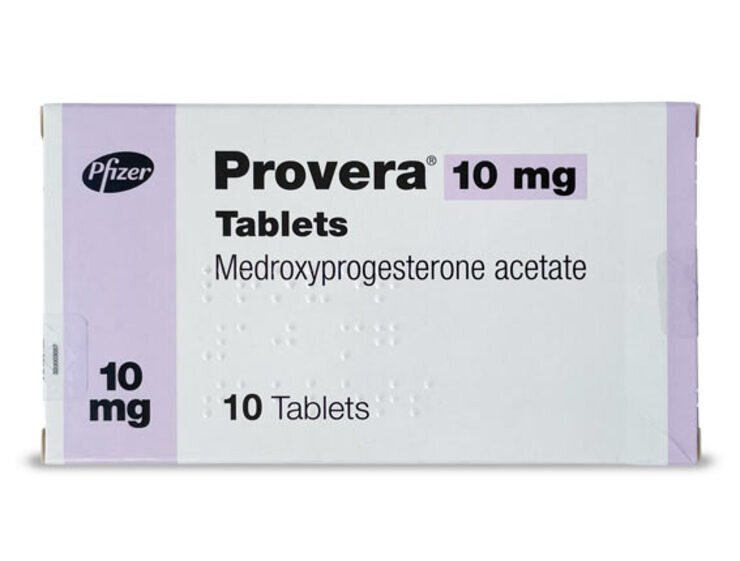Provera


Provera is used to treat conditions such as endometriosis, uterine fibroids, and irregular menstrual bleeding. It is an alternative period delaying option for women not using hormonal contraceptives.
What is Provera?
Provera is a period-delay medication that can also be used to treat or manage several period symptoms including heavy, painful or irregular periods. It may also be used to treat mild to moderate endometriosis.
How does it work?
Provera contains the active substance medroxyprogesterone acetate that can be taken on occasion to delay a period.
Is Provera suitable for me?
If you want to delay your period or lessen period symptoms you should ask your doctor if Provera could be right for you.
Commonly Used Dosage Guidelines for Provera.
Take one tablet three times daily starting 3 days before expected period and continued until period delay is no longer required.
All medications can cause potential side effects, below we have listed some potential side effects, however, these do not always occur.
To view Provera Patient Leaflet click here.
To view PDF patient leaflet click here.
Provera is a medication that belongs to a class of drugs called progestins. Progestins are man-made forms of a hormone called progesterone. Progesterone is important for the development and maintenance of the uterine lining during the menstrual cycle. It also plays a role in implantation and pregnancy.
It can also be used to prevent thinning of the uterus lining (atrophy) that may occur after menopause. This medication may also be used to increase blood levels of progesterone in women who have low levels of this hormone, or who are using certain types of birth control (such as an intrauterine device, or IUD).Provera may also be used for purposes not listed in this medication guide.
To make sure Provera is safe for you, tell your doctor if you have ever had:
- heart disease or a "mini-stroke";
- high blood pressure;
- a blood clotting disorder;
- asthma or allergies;
- migraines;
- diabetes;
- seizures;
- depression or mental illness; or
- liver disease.
Do not use this medicine if you are pregnant. Provera can cause birth defects. If you take Provera while you are pregnant, your baby could die, or be born with breasts and genitals that are not fully developed. Use effective birth control to prevent pregnancy while you are using this medicine. If you think you have become pregnant, tell your doctor right away. Taking Provera can increase your risk of developing blood clots. This risk is even higher if you have certain medical conditions or are taking other medicines that increase your risk of blood clots.
Taking Provera can increase your risk of developing blood clots. This risk is even higher if you have certain medical conditions or are taking other medicines that increase your risk of blood clots.
How should I take Provera?
Provera is usually taken for only a few days, or up to 3 months. Follow all directions on your prescription label and read all medication guides or instruction sheets. Your doctor may occasionally change your dose.Take this medicine with food.
You will need frequent medical tests. You may also need to stop taking this medicine for a short time before a surgery, medical procedure, or dental work. Any doctor or surgeon who treats you should know that you are using Provera.
Store at room temperature away from moisture and heat.Keep the medication in a place where others cannot get to it. Accidental exposure to Provera, especially in children, can cause serious side effects. Do not share this medication with anyone else, even if they have the same symptoms you have.
What happens if I miss a dose?
Take the medicine as soon as you can, but skip the missed dose if it is almost time for your next dose. Do not take two doses at one time.
What happens if I overdose?
An overdose of Provera is not expected to produce life threatening symptoms. However, long term use of high doses can lead to bone loss and increase your risk for fractures. Overdose symptoms may include drowsiness, vomiting, stomach pain, breast tenderness, irregular menstrual periods, or breakthrough bleeding.
What should I avoid while taking Provera?
Avoid being near people who are sick or have infections. Call your doctor for preventive treatment if you are exposed to chickenpox or measles. These conditions can be serious or even fatal in people who are using Provera. Avoid smoking. It can greatly increase your risk of blood clots, stroke, or heart attack while taking Provera. Avoid exposure to sunlight or artificial UV rays (sunlamps or tanning beds). Provera can make your skin more sensitive to sunlight and sunburn may result. Use a sunscreen and wear protective clothing when outdoors.
Provera side effects
Get emergency medical help if you have signs of an allergic reaction: hives; difficult breathing; swelling of your face, lips, tongue, or throat.
Call your doctor at once if you have:
- shortness of breath (even with mild exertion), swelling, rapid weight gain;
- chest pain or heavy feeling, pain spreading to the arm or shoulder, nausea, sweating, general ill feeling; sudden numbness or weakness, problems with vision or speech;
- sudden headache, confusion, pain behind the eyes, problems with vision, seizures (convulsions); menstrual changes - breakthrough bleeding or spotting; change in the amount of urine.
The information provided in this blog post is intended for general informational purposes only and should not be considered as medical advice, diagnosis, or treatment. Welzo does not endorse or sell the medication discussed, nor do we recommend using this information as a substitute for professional healthcare. Always consult with a qualified healthcare provider before making any decisions regarding your health or medical treatment. Welzo assumes no responsibility for any actions taken based on the information provided in this blog.










Plus get the inside scoop on our latest content and updates in our monthly newsletter.